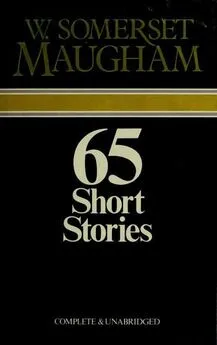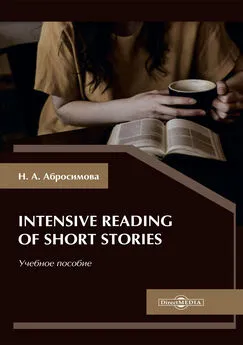Somerset Maugham - Sixty-Five Short Stories
- Название:Sixty-Five Short Stories
- Автор:
- Жанр:
- Издательство:неизвестно
- Год:неизвестен
- ISBN:нет данных
- Рейтинг:
- Избранное:Добавить в избранное
-
Отзывы:
-
Ваша оценка:
Somerset Maugham - Sixty-Five Short Stories краткое содержание
Sixty-Five Short Stories - читать онлайн бесплатно полную версию (весь текст целиком)
Интервал:
Закладка:
Skelton could not imagine why that simple question, asked merely for something to say, should so greatly upset her. But by now all was in order and he shook hands with her. He stepped into the boat and comfortably settled down. They pushed off. He waved to Mrs Grange. As the boat slid into the current she cried out with a harsh, strident scream:
'Give my regards to Leicester Square.'
Skelton heaved a great sigh of relief as with their powerful strokes the paddlers took him farther and farther away from that dreadful house and from those two unhappy and yet repellent people. He was glad now that Mrs Grange had not told him the story that was on the tip of her tongue to tell. He did not want some tragic tale of sin or folly to connect him with them in a recollection that he could not escape. He wanted to forget them as one forgets a bad dream.
But Mrs Grange watched the two prahus till a bend of the river took them out of sight. She walked slowly up to the house and went into her bedroom. The light was dim because the blinds were drawn to keep out the heat, but she sat down at her dressing-table and stared at herself in the glass. Norman had had the dressing-table made for her soon after they were married. It had been made by a native carpenter, of course, and they had had the mirror sent from Singapore, but it was made to her own design, of the exact size and shape she wanted, with plenty of room for all her toilet things and her make-up. It was the dressing-table she had hankered after for donkey's years and had never had. She remembered still how pleased she was when first she had it. She threw her arms round her husband's neck and kissed him.
'Oh, Norman, you are good to me,' she said. 'I'm a lucky little girl to have caught a chap like you, aren't I?'
But then everything delighted her. She was amused by the river life and the life of the jungle, the teeming growth of the forest, the birds with their gay plumage and the brilliant butterflies. She set about giving the house a woman's touch; she put out all her own photographs and she got vases to put flowers in; she routed around and got a lot of knick-knacks to place here and there. 'They make a room look homey,' she said. She wasn't in love with Norman, but she liked him all right; and it was lovely to be married; it was lovely to have nothing to do from morning till night, except play the gramophone, or patience, and read novels. It was lovely to think one hadn't got to bother about one's future. Of course it was a bit lonely sometimes, but Norman said she'd get used to that, and he'd promised that in a year, or two at the outside, he'd take her to England for three months. It would be a lark to show him off to her friends. She felt that what had caught him was the glamour of the stage and she'd made herself out a good deal more successful than she really had been. She wanted him to realize that she'd made a sacrifice when she'd thrown up her career to become a planter's wife. She'd claimed acquaintance with a good many stars that in point of fact she'd never even spoken to. That would need a bit of handling when they went home, but she'd manage it; after all, poor Norman knew no more about the stage than a babe unborn, if she couldn't cod a simple fellow like that, after twelve years on the stage, well, she'd wasted her time, that's all she could say. Things went all right the first year. At one moment she thought she was going to have a baby. They were both disappointed when it turned out not to be true. Then she began to grow bored. It seemed to her that she'd done the same damned thing day after day for ever and it frightened her to think that she'd have to go on doing the same damned thing day after day for ever more. Norman said he couldn't leave the plantation that year. They had a bit of a scene. It was then that he'd said something that scared her.
'I hate England,' he said. 'If I had my way I'd never set foot in the damned country again.'
Living this lonely life Mrs Grange got into the habit of talking out loud to herself. Shut up in her room she could be heard chattering away hour after hour; and now, dipping the puff in her powder and plastering her face with it, she addressed her reflection in the mirror exactly as though she were talking to another person.
'That ought to have warned me. I should have insisted on going by myself, and who knows, I might have got a job when I got to London. With all the experience I had and everything. Then I'd have written to him and said I wasn't coming back.' Her thoughts turned to Skelton. 'Pity I didn't tell him,' she continued. 'I had half a mind to. P'raps he was right, p'raps it would have eased me mind. I wonder what he'd have said.' She imitated his Oxford accent. 'I'm so terribly sorry, Mrs Grange. I wish I could help you.' She gave a chuckle which was almost a sob. 'I'd have liked to tell him about Jack. Oh, Jack.'
It was when they had been married for two years that they got a neighbour. The price of rubber at that time was so high that new estates were being put under cultivation and one of the big companies had bought a great tract of land on the opposite bank of the river. It was a rich company and everything was done on a lavish scale. The manager they had put in had a launch at his disposal so that it was no trouble for him to pop over and have a drink whenever he felt inclined. Jack Carr his name was. He was quite a different sort of chap from Norman; for one thing he was a gentleman, he'd been to a public school and a university; he was about thirty-five, tall, not beefy like Norman, but slight, he had the sort of figure that looked lovely in evening dress; and he had crisply curling hair and a laughing look in his eyes. Just her type. She took to him at once. It was a treat, having someone you could talk about London to, and the theatre. He was gay and easy. He made the sort of jokes you could understand. In a week or two she felt more at home with him than she did with her husband after two years. There had always been something about Norman that she hadn't quite been able to get to the bottom of. He was crazy about her, of course, and he'd told her a lot about himself, but she had a funny feeling that there was something he kept from her, not because he wanted to, but-well, you couldn't hardly explain it, because it was so alien, you might say, that he couldn't put it into words. Later, when she knew Jack better, she mentioned it to him, and Jack said it was because he was country-born; even though he hadn't a drop of native blood in his veins, something of the country had gone to the making of him so that he wasn't white really; he had an Eastern streak in him. However hard he tried he could never be quite English.
She chattered away aloud, in that empty house, for the two boys, the cook and the house boy, were in their own quarters, and the sound of her voice, ringing along the wooden floors, piercing the wooden walls, was like the uncanny, unhuman gibber of new wine fermenting in a vat. She spoke just as though Skelton were there, but so incoherently that if he had been, he would have had difficulty in following the story she told. It did not take her long to discover that Jack Carr wanted her. She was excited. She'd never been promiscuous, but in all those years she'd been on the stage naturally there'd been episodes. You couldn't hardly have put up with being on tour month after month if you didn't have a bit of fun sometimes. Of course now she wasn't going to give in too easily, she didn't want to make herself cheap, but what with the life she led, she'd be a fool if she missed the chance; and as far as Norman was concerned, well, what the eye didn't see the heart didn't grieve over. They understood one another all right, Jack and her; they knew it was bound to happen sooner or later, it was only a matter of waiting for the opportunity; and the opportunity came. But then something happened that they hadn't bargained for: they fell madly in love with one another. If Mrs Grange really had been telling the story to Skelton it might have seemed as unlikely to him as it did to them. They were two very ordinary people, he a jolly, good-natured, commonplace planter, and she a small-part actress far from clever, not even very young, with nothing to recommend her but a neat figure and a prettyish face. What started as a casual affair turned without warning into a devastating passion, and neither of them was of a texture to sustain its exorbitant compulsion. They longed to be with one another; they were restless and miserable apart. She'd been finding Norman a bore for some time, but she'd put up with him because he was her husband; now he irritated her to frenzy because he stood between her and Jack. There was no question of their going off together, Jack Carr had nothing but his salary, and he couldn't throw up a job he'd been only too glad to get. It was difficult for them to meet. They had to run awful risks. Perhaps the chances they had to take, the obstacles they had to surmount, were fuel to their love; a year passed and it was as overwhelming as at the beginning; it was a year of agony and bliss, of fear and thrill. Then she discovered that she was pregnant. She had no doubt that Jack Carr was the father and she was wildly happy. It was true life was difficult, so difficult sometimes that she felt she just couldn't cope with it, but there'd be a baby, his baby, and that would make everything easy. She was going to Kuching for her confinement. It happened about then that Jack Carr had to go to Singapore on business and was to be away for several weeks; but he promised to get back before she left and he said he'd send word by a native the moment he arrived. When at last the message came she felt sick with the anguish of her joy. She had never wanted him so badly.
'I hear that Jack is back,' she told her husband at dinner. 'I shall go over tomorrow morning and get the things he promised to bring me.'
'I wouldn't do that. He's pretty sure to drop in towards sundown and he'll bring them himself.'
'I can't wait. I'm crazy to have them.'
'All right. Have it your own way.'
She couldn't help talking about him. For some time now they had seemed to have little to say to one another, Norman and she, but that night, in high spirits, she chattered away as she had done during the first months of their marriage. She always rose early, at six, and next morning she went down to the river and had a bathe. There was a little dent in the bank just there, with a tiny sandy beach, and it was delicious to splash about in the cool, transparent water. A kingfisher stood on the branch of a tree overhanging the pool and its reflection was brilliantly blue in the water. Lovely. She had a cup of tea and then stepped into a dug-out. A boy paddled her across the river. It took a good half-hour. As they got near she scanned the bank; Jack knew she would come at the earliest opportunity; he must be on the lookout. Ah, there he was. The delicious pain in her heart was almost unbearable. He came down to the landing-stage and helped her to get out of the boat. They walked hand in hand up the pathway and when they were out of sight of the boy who had paddled her over and of prying eyes from the house, they stopped. He put his arms round her and she yielded with ecstasy to his embrace. She clung to him.
His mouth sought hers. In that kiss was all the agony of their separation and all the bliss of their reunion. The miracle of love transfused them so that they were unconscious of time and place. They were not human any more, but two spirits united by a divine fire. No thought passed through their minds. No words issued from their lips. Suddenly there was a brutal shock, like a blow, and immediately, almost simultaneously, a deafening noise. Horrified, not understanding, she clung to Jack more tightly and his grip on her was spasmodic, so that she gasped; then she felt that he was bearing her over.
Читать дальшеИнтервал:
Закладка:










